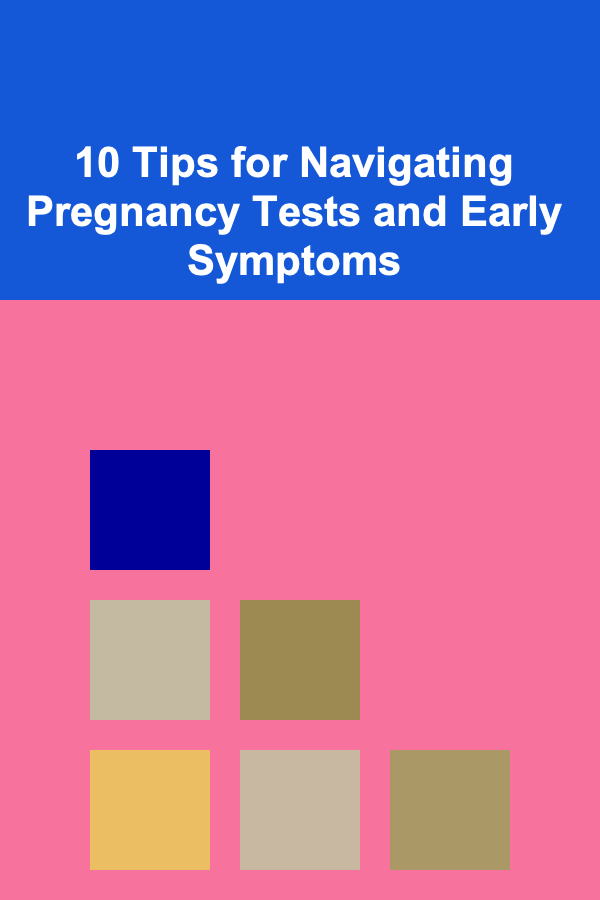
10 Tips for Navigating Pregnancy Tests and Early Symptoms
ebook include PDF & Audio bundle (Micro Guide)
$12.99$10.99
Limited Time Offer! Order within the next:

Pregnancy can be an exciting and emotional journey, but the early days often come with a range of uncertainties, especially when it comes to understanding the signs and symptoms. For many, the first step in confirming pregnancy is taking a pregnancy test, but even that process can be overwhelming with so many options and variables. In this article, we will explore the key steps and tips for navigating pregnancy tests and understanding early pregnancy symptoms. Whether you are trying to conceive or have already missed a period, these tips will help you approach this phase with confidence and clarity.
Understanding the Types of Pregnancy Tests
Pregnancy tests come in two main types: urine tests and blood tests. Both are effective, but they are used at different stages of the pregnancy confirmation process.
Urine Tests
Urine pregnancy tests are the most common type and are available over the counter. They work by detecting human chorionic gonadotropin (hCG), a hormone produced by the placenta shortly after the embryo attaches to the uterine lining. Home pregnancy tests (HPTs) are generally easy to use and offer quick results within minutes. These tests are typically accurate if used correctly, especially after a missed period. However, testing too early can lead to false negatives, as the hormone levels may not be high enough to detect.
Blood Tests
Blood tests are conducted in a doctor's office and can detect pregnancy earlier than urine tests, typically within 6 to 8 days after ovulation. There are two types of blood tests:
- Qualitative hCG test: This test simply checks whether hCG is present in your blood, confirming pregnancy.
- Quantitative hCG test: This measures the exact amount of hCG in your blood and can provide more detailed information about how far along the pregnancy is.
Blood tests are more sensitive than urine tests and can confirm pregnancy even before a missed period, but they are less commonly used unless required for medical reasons or early confirmation.
Tip: Use a Sensitive Pregnancy Test
If you're using a home urine test, choose one with a higher sensitivity level, as these tests can detect lower amounts of hCG. Some tests claim to detect pregnancy even before a missed period, although results are typically more reliable a few days after your expected period.
When to Take a Pregnancy Test
Timing is critical for accurate results. While it can be tempting to test right after the suspected moment of conception, waiting until after a missed period will yield more reliable results.
Early Testing
If you choose to test before your missed period, you may get a false negative result because hCG levels may not have risen enough to be detectable. It's best to wait until at least the first day of your missed period to take a home pregnancy test.
Tip: Test First Thing in the Morning
To increase the accuracy of your results, it's best to take a pregnancy test first thing in the morning. Your urine is more concentrated after a full night's sleep, which can help detect lower levels of hCG.
What to Do if Your Test is Negative
If your test comes back negative, don't panic just yet. A negative result could be due to testing too early or inaccurate use of the test. If you still suspect you're pregnant, it's a good idea to retest in a few days or wait until after your missed period to test again.
Tip: Follow the Instructions Carefully
Each pregnancy test has specific instructions that must be followed for accurate results. Make sure you read the instructions thoroughly, particularly regarding the time frame for reading the results. Testing too early or too late may lead to incorrect conclusions.
Understanding Early Symptoms of Pregnancy
In addition to taking a pregnancy test, there are several early symptoms of pregnancy that may help you identify whether you are pregnant. While every woman's experience is different, some common early symptoms of pregnancy include:
Missed Period
A missed period is often the first sign that you may be pregnant. However, some women experience light bleeding or spotting in early pregnancy, which can be mistaken for a period. If your cycle is irregular, a missed period might not be an obvious indicator.
Fatigue
Feeling unusually tired is a common early pregnancy symptom. The body is working hard to support a growing embryo, which can lead to increased levels of exhaustion. Hormonal changes, particularly the rise in progesterone, can also contribute to feelings of fatigue.
Morning Sickness
Nausea and vomiting, often referred to as "morning sickness," is another hallmark symptom of early pregnancy. It typically starts around the sixth week and can last until the end of the first trimester, though some women experience it longer. Despite the name, it can occur at any time of the day or night.
Tender Breasts
Hormonal changes early in pregnancy can make your breasts feel sore, swollen, or tender. This is often one of the first signs many women notice, typically occurring around one to two weeks after conception.
Tip: Keep Track of Symptoms
Keeping track of your symptoms in a journal can help you determine if they align with early pregnancy signs. This can also provide valuable information for your healthcare provider if you need assistance.
False Positives: Understanding What Could Go Wrong
While false negatives are more common, false positives can also occur, though they are rare. A false positive happens when a pregnancy test incorrectly indicates that you are pregnant. Some possible reasons for a false positive result include:
- Chemical Pregnancy: A chemical pregnancy occurs when a fertilized egg implants in the uterus but fails to develop properly. This can lead to a positive test result, followed by a miscarriage shortly thereafter.
- Medications: Some fertility treatments or medications containing hCG may interfere with the test, causing a false positive result.
- Ectopic Pregnancy: An ectopic pregnancy, where the fertilized egg implants outside the uterus, can also produce positive test results without leading to a viable pregnancy.
Tip: Confirm with a Blood Test
If you suspect a false positive or have any concerns, it's best to visit your healthcare provider for a blood test. This can provide a more accurate confirmation of pregnancy and help rule out complications like a chemical pregnancy or ectopic pregnancy.
Dealing with Early Pregnancy Anxiety
Waiting for pregnancy test results can be an emotional rollercoaster, especially for women who have been trying to conceive. Anxiety about whether or not you are pregnant is normal, but it's important to manage your emotions during this time.
Tip: Stay Calm and Patient
Practice mindfulness or relaxation techniques to help manage stress. While it can be difficult to wait for results, keeping a calm and patient mindset will help you navigate the uncertainty more effectively.
What to Do After a Positive Pregnancy Test
Once you've confirmed a positive pregnancy test, the next steps are crucial for ensuring a healthy pregnancy. Here are some immediate actions to take:
- Make an Appointment with Your Doctor: Schedule a visit with your healthcare provider to confirm the pregnancy and begin prenatal care.
- Start Taking Prenatal Vitamins: Begin taking prenatal vitamins with folic acid to support the early development of your baby.
- Avoid Harmful Substances: If you haven't already, stop drinking alcohol, smoking, or consuming any other substances that could harm the pregnancy.
- Track Your Symptoms: Continue tracking any early pregnancy symptoms, as this information can be helpful during your appointments.
Pregnancy Myths: What to Ignore
There are many myths and misconceptions about pregnancy that can cause unnecessary confusion. It's important to separate fact from fiction when navigating this process.
Myth: "You Can't Be Pregnant if You Have Periods"
While light spotting or bleeding can occur in early pregnancy, a full period is unlikely once you are pregnant. If you experience bleeding, consult your doctor for clarification.
Myth: "Morning Sickness Means It's a Girl"
There's no scientific evidence to support the idea that the severity of morning sickness indicates the sex of the baby. It's simply a symptom of pregnancy.
The Role of Stress in Pregnancy Symptoms
Stress can influence both the likelihood of conception and the experience of pregnancy symptoms. Excessive stress can disrupt hormonal balances and lead to delayed periods or changes in symptoms.
Tip: Manage Stress Effectively
Maintaining a healthy lifestyle, exercising, eating well, and practicing stress-reducing activities like yoga or meditation can help you manage stress and improve your chances of a healthy pregnancy.
When to Seek Medical Advice
If you experience any of the following symptoms, it's important to consult with a healthcare provider as soon as possible:
- Severe cramping or bleeding
- Dizziness or fainting
- Pain in the abdomen or pelvis
- Severe nausea or vomiting (more than what's typical for morning sickness)
- Any other symptoms that concern you
Your healthcare provider can help you navigate the early stages of pregnancy and provide guidance on managing any complications.
Conclusion
Navigating pregnancy tests and early symptoms can be an overwhelming experience, but with the right information and support, you can approach it with confidence. Understanding the different types of tests, when to take them, and how to interpret early symptoms is crucial for making informed decisions about your pregnancy. Keep track of your symptoms, stay patient, and seek medical advice when necessary to ensure the best possible start to your pregnancy journey.
Reading More From Our Other Websites
- [Home Party Planning 101] How to Plan the Ultimate Dinner Party at Home
- [Personal Care Tips 101] How to Boost Your Confidence with Smooth, Exfoliated Skin
- [Home Lighting 101] How to Choose the Best Task Lighting for Your Home Office Productivity
- [Hiking with Kids Tip 101] Adventure Safely: How to Teach Children the Golden Rules of Hiking
- [Personal Care Tips 101] How to Create a Sensory-Friendly Personal Care Routine for Sensitive Individuals
- [Organization Tip 101] How to Create a Mudroom Area in Your Garage
- [Simple Life Tip 101] How to Transition to a Low‑Maintenance Indoor Plant Collection for Busy Lives
- [Personal Care Tips 101] How to Maintain Healthy Scalp and Hair with Dry Shampoo
- [Trail Running Tip 101] Innovations in Trail Running Fabrics: What's New and Why It Matters
- [Screen Printing Tip 101] Best Maintenance Routines to Extend the Life of Screens and Frames in Print Shops

How to Build a Family Gardening Project for Beginners
Read More
How to Decorate a Small Apartment for the Holidays
Read More
How to Turn Your Deep Learning Projects into Money-Making Opportunities
Read More
How to Use Social Media Analytics to Measure Influencer Campaign Success
Read More
How to Master Double Exposure Photography
Read More
How to Find Free Community Events
Read MoreOther Products

How to Build a Family Gardening Project for Beginners
Read More
How to Decorate a Small Apartment for the Holidays
Read More
How to Turn Your Deep Learning Projects into Money-Making Opportunities
Read More
How to Use Social Media Analytics to Measure Influencer Campaign Success
Read More
How to Master Double Exposure Photography
Read More